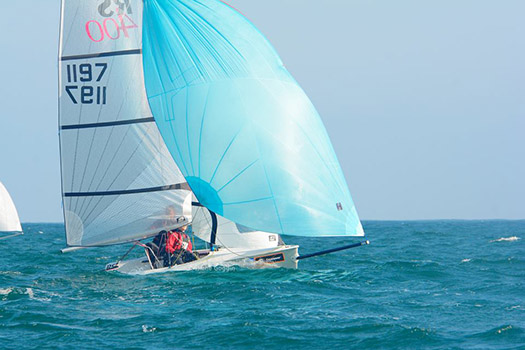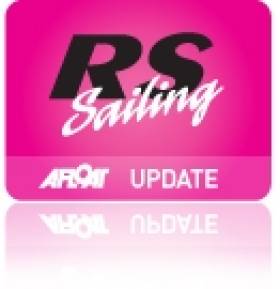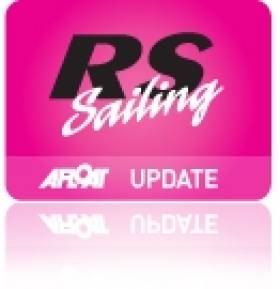Displaying items by tag: David Rose
#rssailing – To the untrained eye it was business as usual for the RS400 class racing out of the Royal Irish Yacht Club in Dun Laoghaire over the weekend. We had a big and very competitive fleet of 25 RS400's add to this the sight of new sails pouring out of the McCready's sailboats van on the first morning and the scene was set. The expectation of great racing, and a forecast for good wind and sun had everyone excited.
Overall results sheets for each fleet are downloadable below as pdf files.
The fleet's current top names are all well-established now. But look down the fleet at the new names and the general quality of the field and you will know that this event and this season is something special in Irish Sailing. Nobody in the top 12 was a rookie this year and Sean Cleary, defending Eastern Champion and runner up at the Sothern's and for the overall traveler's series last season was to finish up 12th. He was sailing with a new team mate Donal Murphy who had helped him to second RS400 in the local frostbites a few weeks earlier. Sean heads to England for a new job now and he will be sorely missed at Irish regionals. We look forward to following his progress, no doubt at the front of the UK 400 scene. He is expected to re-appear at the Irish Nationals later in the season.
New class member and Ex-helmsman's champ George Kenefick finished 16th overall. He will no-doubt be more competitive as the season progresses, and expressed some frustration at his form, he is one to watch over the season. Ex-Mirror world runner up and Ex-Mirror National Champion Andrew Woodward and crew Michael Walsh on their first outing with fresh sails came in 13th. Of course this is just one event and high quality sailors like Andrew, Sean and George will always find a way to excel in a class, but there is a feeling now in this class that anyone can be outside the top 10 in any race. A notable statistic looking at the results is that only three sailors managed to have all six race results inside the top ten over the Eastern championship weekend.
Now let's talk the business end of the fleet. Coming into this regatta, Alex Barry and Richie Leonard of MBSC/RCYC had been pushed hard for all of the 2014 season, but were an unbeaten pairing in the Irish events they attended together and had taken the travelers title, and Nationals. Gareth Flannigan and David Fletcher were of a pedigree that had them likely to compete for top honours, with a history of winning national titles in a variety of classes including the Laser and SB20. Local RStGYC team and Ex RS400 national champion paring of Emmet Ryan and his brother James were together again for their first regional since the 2013 season (James had been on a year of travel).
The Ryan team had been tuning up in the frostbites and it showed, with a great recovery from an average start line position and an opening race win to set their stall out early. They would be competitive to the end, and had they won the last race would have been champions. In the end the Ryan's had to make do with a couple or race wins that contributed to their 3rd place overall. James will be proud of the fact that he clearly has not lost his competitive edge on his travels.
Gareth Flannigan showed why he has about six nicknames mainly describing him as some sort of fish in water as he and David Fletcher had pace to burn upwind and were extremely consistent all event off the start line. Like Ryan he recorded two bullets, but he also managed to keep his other scores in the top 5 and had the sort of regatta dreams are made of.
Alex Barry and Richie Leonard were not going to be easy to beat, and showing their class, after a string of top 3 finishes, the top Irish pairing fought off David Rose and Ian Hef on the last run of the last race to record a bullet and do enough it would seem to take the regatta. As it turned out, a boat that had been disqualified for being OCS on day one had been reinstated (It felt from where I was sitting that a few boats were over on that start) and Alex and Richie were to be denied due to this points change and only by the a countback, having matched Gareth and David's 11 point tally.
This fleet is super competitive and there were just six points separating the 3rd placed Ryan team on 20 points with 5th and 6th placed teams Chirs Penny (Artemis-Racing) and Simon Martin, and David Rose and Ian Hef on 26. Ross McDonald and Dylan Gannon finished 4th just two points behind Ryan on 22, after an excellent regatta. Ross is an Ex-Laser National Champion. So congratulations to Gareth and David sailing out of BYC who are well deserved 2015 RS400 Eastern Champions. Excitement is already building for the Northern champs up next in the regional calendar. Remember for those in the fleet looking to sharpen up their skills, there is a sprint regatta out of the Royal St George Yacht Club on May 9th, for RS200's and RS400's.

RS Fevas
Sixteen Feva teams turned out to compete for the Eastern title this year. This is an exciting year with a trip to the worlds coming up later in the season. The fleet included two visiting teams from Galway (GBSC), and both fared very well in the event with a fourth for Aaron O'Reilly and David Carberry and a seventh for Brian Murphy and David O'Reilly. Great to see Feva's that are willing to travel and make this class really exciting.
The top three places were all local Dublin bay RSGYC sailors. Triona Hickson and Kathy Kelly won the first two races of the event and finishing just 3 points off the lead in third place could easily have been champions.
Toby Hudson-Fowler and Greg Arrowsmith had an excellent regatta and would finished second on 10 points, just one point behind Tom and Henry Higgins, who took the championship in the last race.
Congratulations to Tom and Henry Higgins who are RSFeva Eastern Champions for 2015.
RS200s
There were many very well attended events last season in Ireland. This season is an exciting one for the RS200's particularly as the fleet welcomes a revamped sail plan that modernizes the boats look and feel.
The turnout for this event was effected by exam season for the younger members of the class, so expect bigger fleets as the season progresses.
The top end of this fleet looked very familiar, as Marty O'Leary and Rachel Williamson sailing out of RSGYC continues to dominate the RS200 Class in Ireland with a performance including three bullets, two seconds and a third. Marty and Rachel had showed their class before the event, finishing runner up to the Ryans RS400 team in the frostbites.
They were matched this time on points by the every present Ex National champion Sean Craig and Heather King, who would only be second on countback having matched Marty and Rachel this time also on a final point's tally of 7. Frank O'Rourke and Sarah Byrne were eight points back in third, and Luke Murphy and Patrick Cahill had some great moments and finished fourth overall. Luke and Patrick are strong prospects for the future and sail out of RSGYC. Congratulations to Marty and Rachel who are RS200 Eastern Champions for 2015.
'RS400 Explosion of Action and Enthusiasm', A 'Newbie' Comments
#rssailing – David Rose, a new member of the RS class, sends these comments on the weekend's Eastern Championships at Greystones.
As one of the new members of the RS400 class in Ireland, and someone who has not sailed a dingy for a while, I arrived at Greystones for the Irish RS-Eastern Championships not fully knowing what to expect. What I found was a very welcoming club and town, with great facilities for dinghies. More Importantly I found a class that was from all four provinces of Ireland and for the purest sailor at any given level.
The RS400 fleet has simply exploded. Going from a good base over the last few years, the spike in interest and enthusiasm has been enormous and one suspects this boom for the RS400 will also lead to bigger fleets in the smaller sister class of RS200 who share events and also have a great Irish fleet.
The numbers say it all, this was the first event of season, and an unbelievable turnout of 27 RS400's from all over Ireland and 14 200's fought it out in exciting conditions all weekend. The Feva class was also well attended and made for a great mix of people in the dinghy park.
As a newbie to the class, I could not have met with more people willing to share information or a helping hand, be it on boat setup or how to get the most out of my 400 on the water. A few people in the class have tirelessly promoted the boats over the last few years, by not just facilitating the movement of boats from the UK mainland to Ireland, but also by encouraging people to get involved in what is now the largest single fleet on these shores, and probably the most competitive.
These boats are not brand new, this year they will celebrate their 20th national championships in the UK. This means that there is a low barrier to entry for the class with boats ranging in value from £1,500 for an entry level model, up to £10k for those of us no longer thinking about the recession. A good one can be bought for £3,500, or an older one can be brought up to race speed quite easily with a few upgrades to the equipment. The hulls have stood the test of time very well, with low numbers featuring in the results both in the UK and Ireland at every event.
This class is an exciting, affordable option for the Irish sailor, and offers up a great circuit on this Island and abroad in the UK or if you are very adventurous, there is a regular event in Lake Garda, where one can combine a sun holiday with some top class racing.
I am sure the Irish class association will release a full race report on the ups and downs of the racing which was sailed in very difficult conditions and won in the end by local sailor Sean Cleary and his crew Steve Tyner by the slimmest of margins from Alex Barry and George Kenefick from Cork and establish runners Bob Espey and Michael Gunning from Ballyhome Yacht Club.

























































